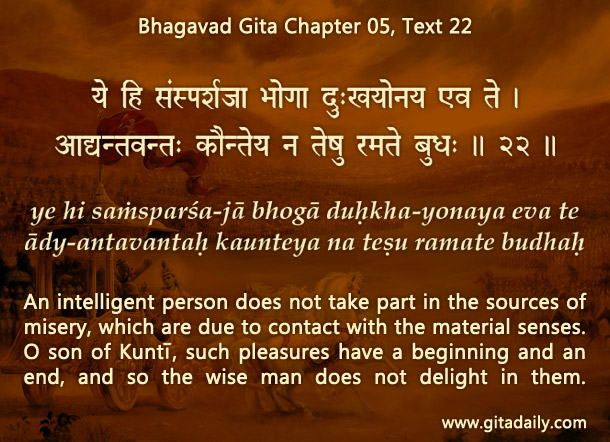Intelligence shows how indulgence is harmful and how harmful indulgence is
Less than a century ago, smoking was considered harmless. It took decades of intelligent investigation to reveal that smoking harmed health, and harmed it so much.
We need a similar intelligent investigation to expose another glamorized activity: indiscriminate sensual indulgence. That investigation exposes the harms of sensual indulgence in two ways:
How indulgence is harmful: The Bhagavad-gita (18.38) stresses that though sensual indulgence initially appears enjoyable, it ends up making us miserable. The pleasure of indulgence is preceded by hankering and succeeded by lamenting. Hankering means that we want the pleasure, immediately and irresistibly. Lamenting means we resent that the pleasure ended so soon. Over time, the hankering and lamenting increase, whereas the intervening pleasure decreases. Eventually, the pleasure becomes just a short-lived relief from the self-inflicted torment of constant hankering and lamenting. Because indulgence is usually physical and visible, whereas hankering and lamenting are psychological and invisible, we need intelligence to see how indulgence is harmful
How harmful indulgence is: The Gita (03.39) warns that self-destructive desire is an eternal enemy. Indulgence infects our psyche with indelible impressions that haunt us far beyond our present lifespans. Apart from such psychological torment, indulgence can also sentence us to terrible karmic consequences. Most damagingly, indiscriminate indulgence fuels sensual obsession that obstructs spiritual absorption (02.44). And we stay deprived of the lasting happiness that is our right as blissful parts of the blissful whole. As all these consequences aren’t visible, we need intelligence to appreciate how harmful indulgence is.
When we are guided by intelligence, we can wisely desist from indiscriminate indulgence (05.22). And by firmly turning our backs toward sensuality, we can determinedly practice bhakti-yoga to connect with the all-attractive whole, thereby accessing imperishable happiness (05.21).
Think it over:
- How can we understand that indiscriminate sensual indulgence is harmful?
- How can we understand how harmful such indulgence is?
- When we understand the harms of such indulgence, what can we do?
***
05.22 An intelligent person does not take part in the sources of misery, which are due to contact with the material senses. O son of Kunti, such pleasures have a beginning and an end, and so the wise man does not delight in them.
To know more about this verse, please click on the image
Explanation of article:
https://www.youtube.com/watch?v=Vkb19kfQ8qU
Podcast:


JAPA guides you every way